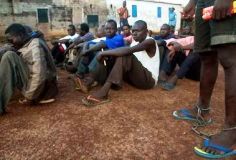South Sudan battles to create modern legal system
June 28, 2006 (YEI, Sudan) — Emmanuel Batali was accused of conspiring with the devil to kill people. He has spent three months in a dilapidated prison in Yei, southern Sudan, and is still waiting for his day in court.
 After more than two decades of civil war, official structures such as courts have ceased to function in the south.
After more than two decades of civil war, official structures such as courts have ceased to function in the south.
A 2005 peace deal ended Africa’s longest civil war and the south formed an autonomous government. The new authority is still trying to assert itself, and tribal law still dominates in many areas.
“My chief said I went to the devil spirit to kill people — it’s completely absurd,” said 18-year-old Batali. He says the truth is he fell out with his tribal chief over business.
“I still haven’t seen a magistrate. The law is not good.”
Sudan’s north-south war broadly set the Islamist northern government against mostly Christian and animist southern rebels. Complicated by ethnicity and hunger for oil, the violence cost 2 million lives, mostly through famine and disease, and forced more than 4 million people to flee their homes.
During the conflict, rough justice was meted out by commanders or local chiefs. The new government is trying build a formal legal system with newly trained professionals to enforce a modern concept of human rights law.
It is grappling with rising crime and lack of funds.
In Yei — one of the region’s main towns near the border with Uganda and the Democratic Republic of Congo — prisoners as young as eight are crammed into the prison’s run-down and crumbling buildings.
“It’s as if we are still in the bush under the mango trees,” said prison governor Martin Lado.
VAGUE BOUNDARIES
Traditional leaders here still have to be convinced of the authority of the new legal system. Customary law — the law of the tribe — has always played an important role in southern Sudanese society.
Lado says he has little sway over tribal chiefs.
“A chief can send a person directly to prison but we have to receive them. We have no choice,” he said.
Harriet Kuyang, of the South Sudan Law Society, says authorities must clarify distinctions between tribal law and the legal system to make sure that customary law is implemented without prejudice, and without victimising women or minorities.
The line between the jurisdiction of tribal law and the legal system is blurred. Adultery is not on the criminal statute book but it is against customary law and punishable by a fine. Often women, unable to pay, end up in jail.
Nancy Noka, 19, has been inside for a fortnight for what she said was, “taking a second husband”. She wanted to escape an abusive older husband and ran off with a young lover.
Lodeli Morris, aged 12, was jailed three months ago for murder, living in cramped conditions with adult male prisoners. He has not been tried yet.
“If Lodeli Morris were in school he would be a very clever boy,” Morris said, mischievously echoing the words of everyone from the prison governor down.
Morris, a cobbler, used a needle for sewing leather to stab an older boy, who had bullied and beaten him.
“I was not clear in my head. It was just an accident,” he said.
Every evening, he files in with the adult prisoners to spend a night on the floor of the jail’s one surviving outbuilding. Morris will remain in jail until February 2007.
Akur Ajuoi, a lawyer working for the U.N. children’s agency UNICEF, says the teenage cobbler is not the youngest detainee.
The minimum age of criminal responsibility — 10 years — is frequently disregarded, she said, and minors are kept for long periods on remand or in jail in lieu of financial compensation.
Ajuoi is working with the government to reform the system.
A children’s act, working its way through parliament, will establish a new juvenile justice system, spell out authorities’ responsibilities for child welfare and establish an independent commission to monitor violations.
Cases will be heard by `Buma’ committees, headed by local chiefs, avoiding a referral to the courts.
Yei Commissioner David Moses says he is determined to change the rule of law in the south.
“It’s very important that if a person is in prison it is by the will of the judge following the law,” he said, outlining government plans to train 600 new magistrates and judges in neighbouring Uganda.
“There is training for war and training for peace,” he said. Many of south Sudan’s civil service have spent two decades in the bush fighting. Some have even forgotten how to read properly.
“Now they need to be retrained — not only in their old skills but also in new developments for the world has changed, there are human rights and so we have new challenges too,” Moses said.
(Reuters)
